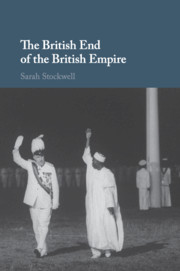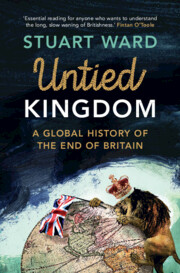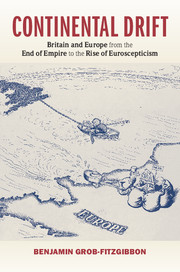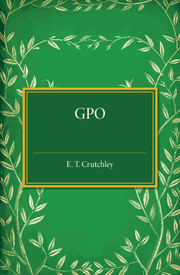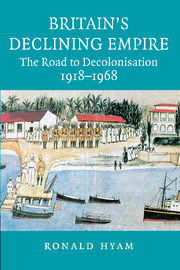The British End of the British Empire
How did decolonization impact on Britain itself? And how did Britain manage its transition from colonial power to postcolonial nation? Sarah Stockwell explores this question principally via the history of the overseas engagements of key institutions that had acquired roles within Britain's imperial system: the Universities of Oxford and Cambridge, the Bank of England, the Royal Mint, and the Royal Military Academy Sandhurst. Using a huge range of fresh archival sources, the author shows how these institutions fashioned new roles at the end of empire, reconfiguring their activities for a postcolonial world and deploying their expertise to deliver technical assistance essential for the development of institutions in new Commonwealth states. This study not only pioneers an entirely new approach to the history of the British end of the British empire, but also provides an equally novel cross-sectoral analysis of institution-building during decolonization and highlights the colonial roots of British postcolonial aid.
- Students and scholars of development in the postcolonial era will benefit from a new and original perspective illuminating the early development of British technical and military assistance to new Commonwealth states
- Shows how British institutions evolved their own versions of 'imperialism' at the end of empire, as they sought to substitute new roles for their established ones within the imperial system
- Proposes a new model of the British imperial system by showing how domestic institutions on the margins of the imperial state had become stakeholders in it
Reviews & endorsements
'With this book Sarah Stockwell emerges as the one of the foremost economic historians of the British Empire. By studying the linkages between the colonial service, the universities, the Bank, the Army and above all the Mint, she explains the reasons British overseas businesses were able to carry on and move with the times, with difficult and painful adjustments, eventually finding significant success hardly imaginable in the era of decolonization.' Roger Louis, University of Texas
'Any sophisticated grasp of the peculiarly British dimensions of global decolonization in the decades after 1945 needs to come to grips with the empire's domestic institutional stakeholders. In this meticulous study, Sarah Stockwell delivers just that. Brimming with insights, The British End of the British Empire reveals how the institutional framework of empire persisted, and at times even flourished, in a changing world.' Stuart Ward, University of Copenhagen
Product details
January 2020Paperback
9781107680883
351 pages
230 × 153 × 20 mm
0.51kg
22 b/w illus. 9 tables
Available
Table of Contents
- 1. The imperial roles of British institutions
- 2. Technical assistance and state building at the end of empire
- 3. Teaching what 'the natives need to know': the Universities of Oxford and Cambridge and training for overseas public administration
- 4. 'Education and propaganda': the Bank of England and the development of central banking in African states at the end of empire
- 5. Making Money: the Royal Mint and British decolonization
- 6. 'Losing an empire and winning friends': Sandhurst and British decolonization.

